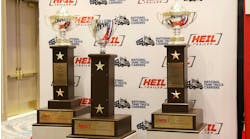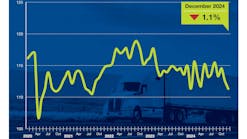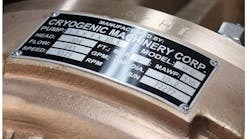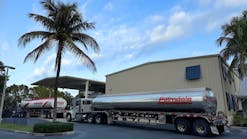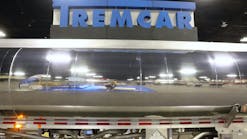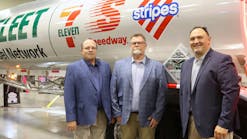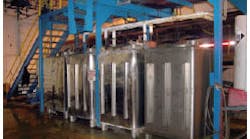Being Diversified is proving to be an advantage for Red and Michael Van Duyn, brothers and owners of Mac-Del Inc in Richmond, Indiana, as they operate their tank wash, commercial shop, and transportation services by staring down a sluggish economy.
“We have been serving the chemical transportation industries for over 38 years,” says Michael. “That experience really pays off when we hit troubling economic times.”
Although the company's tank cleaning division relies on the auto industry for its bread and butter, there are other markets that are helping to fill the gap while awaiting recovery. At the same time, the transportation division, with tractors and tank trailers in its fleet, is expanding as a chemical fleet operator for Miller Transporters Inc based in Jackson, Mississippi.
Another bonus for the company's operation was the decision in 1989 to expand the wash facility and construct additional shop space on the 10-acre site. The decision is a key feature of the Richmond facility that enhances a mixed operation. As a result, the company is in a good position to handle a variety of business that comes its way. Currently, about 400-450 tank trailers are cleaned monthly at the facility for about 55 customers.
“Our four-bay cleaning facility provides fast service with minimal delays,” says Michael. “We emphasize our specialized service that handles hard-to-clean tank trailers and intermediate bulk containers (IBCs). We always say that our best is the least we can do for our customers.”
Family business
Very much a family business, the company originally was founded in 1968 by the current owners' late father, Robert, and mother, Helen, who remains active in the business. Their brother, Roger, works in maintenance while Michael's daughter, Kelley McElhany, represents the third generation involved in the company.
In the beginning, the company was a Toledo, Ohio, fleet operator for Rogers Cartage. In 1989, the owners decided to add a tank cleaning facility in Richmond. As the business grew, it became a partnership and was incorporated in 1987. Today, Mac-Del conducts business through two divisions: the wash division, including the shop overseen by Michael, and the fleet operation directed by his brother.
“Both Red and I grew up watching our parents in the trucking industry,” says Michael. “We think our early experience as truck drivers and dispatchers prepared us to understand the idiosyncrasies of the tank truck industry.”
More recently, Michael has experienced the rising cost of chemicals used in the wash service. Caustic, about 90 cents a gallon a couple of years ago, now commands a price of $4.10 a gallon. “We've watched that price escalate,” he points out. “Sulfuric acid used in wastewater treatment has followed a similar cost trend.”
While Michael's expertise lies in keeping up with tank cleaning technology, Red stays current with trucking regulations and operation management to be on top of the industry variations.
Tank wash
At the four-bay tank wash (with ISO 9001 designation), two bays are dedicated to BASF Corp chemical operations, one of those for specific products and the other for initial cleaning. Each dedicated bay has individual 575-gallon stainless steel vats and piping. Air and acid are combined to mist trailer interiors to break down difficult-to-clean products. Water in the dedicated bays is not recirculated.
The wash rack's third and fourth bays handle general chemical tank cleaning, and IBCs and were designed by a team of employees. Stainless steel vats and piping are shared in the general cleaning bays, and water is recirculated.
All of the bays utilize high-volume, low-pressure systems driven by 30-horsepower Grundfos pumps and have Sellers 360 spinners. “We have always been pleased with the Sellers spinner performance and not having to handle unnecessary seal changes,” says Michael.
Equipment also includes a 100-horsepower Eclipse boiler and a 100-horsepower Hearst boiler for backup.
The bay for IBC cleaning contains a converted 7,000-gallon, three compartment tank trailer that holds hot and cold water and presolve mixture. In addition to IBC cleaning, the company provides repair, testing, and recertification service for the totes.
Presolve and caustic services are available, as well as hot and cold rinses, deionized water rinses, and tank exterior washing. In addition to tank cleaning, the company provides passivation, deodorizing, and steam heating. Product hoses and pumps are cleaned with the tank trailers.
Precise cleaning is required for tank trailers hauling certain paint products, such as clearcoat. A laboratory is onsite for microscopic evaluation to insure standards are met. “We have a time-tested system of checks and balances to prevent contaminations. Additionally, our cleaning procedures are inspected by our trucking customers.”
All of the Mac-Del trailers receive exterior washes in addition to interior cleaning after each load. A power wand with a Chemex cleaning product is used in the finishing.
Personnel training
Open Monday through Friday from 8 am until 1 am with two shifts and Saturday with one shift, the tank wash employs six tank cleaners. Michael provides training that includes topics on confined space entry, nitrogen blankets, fall protection, and slips, trips, and falls. Workers learn the procedures required to handle hard-to-clean products to meet customer standards.
“It usually takes at least 60 days to train new hires,” says Michael. “We see a variety of products, including resins, surfactants, adhesives, and hydraulic fluid. Some products may require a day's work. Companies constantly change paint products to improve them, particularly those used in electrocoating, so we have to keep up with the products' contents in order to clean the tanks properly. As new products are developed, so are the tank cleaning procedures. That means co-coordinating with the companies and more training for our employees. In addition to all that, our services cover dry bulk trailers that haul plastic pellets and powders.”
Wastewater capability includes a 2,000-gallon holding tank where Versi-Matic stainless steel pumps supply air for aeration. Wastewater is then pumped into a 7,800-gallon overhead tank where flocculants are added. Water is pumped from the tank into the sewer, and the heavy product is filter pressed and removed to a nearby municipal non-hazmat waste disposal site.
Repair services
Working in conjunction with the tank cleaning is the full-service shop. Three bays are available for tractor and trailer repairs, including tank equipment such as pumps and hoses. Engine rebuilding and other repairs are offered for trucks, as well as services for running gear. The shop provides preventive maintenance and testing and offers a service truck for road breakdowns.
Five mechanics, including a certified cargo tank inspector, are on duty in two shifts from 7 am until midnight Monday through Friday. One mechanic is available on Saturdays and Sundays.
When drivers drop off vehicles for cleaning or repairs, they find a lounge equipped with showers, coffee, vending machines, and available fax and copier machines. Paved and secure fenced parking space also is provided. A 24-hour drop-off service is available.
Transportation services
For its Miller Transporters service, Mac-Del operates 30 tractors and 64 DOT307/407 tank trailers. In addition, a pneumatic trailer runs in dedicated service.
Looking to the future, Michael expects the auto industry to regain its health, but other market opportunities will be developed in the meantime. He expects to see an increase in the IBC cleaning service and new customers through the Miller relationship. “We also will be considering special projects,” he adds.
Having a tank cleaning facility in place that already can handle special jobs and is ISO 9001 designated, as well as having a diversified business that has been in operation for decades, Mac-Del is in a good position to ride out the current economic distress and is well-positioned for the future.
